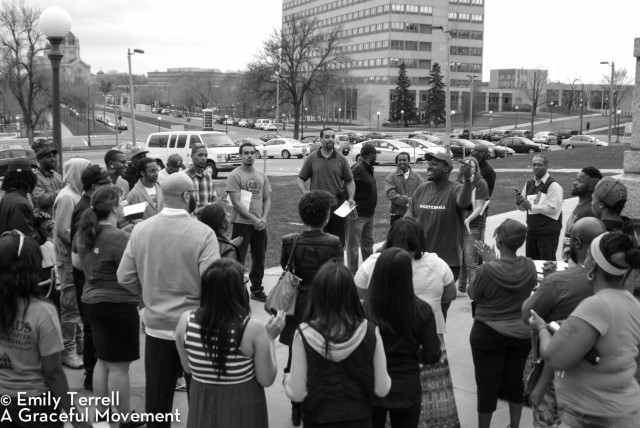Did you see the Star Tribune’s article last week reporting that income for Black families had plummeted from its already dismal level? If you didn’t, pause right now and read it. Everyone should.
According to the US Census Bureau, from 2013 to 2014, Black households lost $4,500 of their annual median income, lowering it to $27,000. That’s a drop of 14%. White median income is $64,800. For Asian families, $68,000. Latino families sit at $42,000. The poverty rate in our state held steady at 11%, which is unacceptable. But for blacks, the poverty rate increased to 38%. Let me repeat: for Black households in Minnesota, more than 1 in 3 are living in poverty. This is truly damning. Everyone in our state should be outraged, embarrassed, and most of all, motivated to take action against this persistent pattern of injustice.

As I read more and the facts began to sink in, here’s what became clear to me.
First, racism is baked into each and every system, structure, and institution in our state. Second, the elite consensus that has governed Minnesota for decades has deliberately avoided any conversation about racial disparities and the harm felt by all of us. Third, when we fail to confront this stark and painful reality, it slowly becomes accepted. “It’s just another statistic.” “Just the way the world works, I guess.” This attitude, this fatalistic public narrative, is just as corrosive and insipid as the racism that is tearing us apart.
These statistics also don’t tell the whole story. For instance, the presence of Native/indigenous peoples is completely absent. They leave out the reality of undocumented people and refugees who often experience poverty and exploitation in the workplace. And, by looking at the lost income of black Minnesotans, we should not be tricked into thinking other communities of color are getting ahead. Because more often than not, they aren’t.
This isn’t a “black problem” nor is it a “people of color problem.” This is a problem for each and every one of us who see the inherent worth and dignity in another and who recognize that our fates are tied to each other. For anyone who is outraged by the extraordinary inequity in our state, we need to organize with others and to develop a greater sense of common cause while also rejecting the politics that says “it’s ok that others are left behind, so long as you get ahead.” Because those politics are morally corrupt. And foolishly short-sited. And cruel.
As Minnesotans, we are often proud of ourselves for leading other states in education, health, and income. But ranking 45th in the nation for median income for black households, behind Mississippi, is not just an embarrassment – it’s a crisis. Being a state where some get ahead because of the color of their skin, while others are left behind for the same reason, means we are not the leaders we think we are.
If there was ever a story or statistic that cries out for the need to change who gets to make decisions in this state and who benefits from those decisions, this is it. This is the case for building grassroots power to change the priorities of our government. But it’s also a call to create completely new institutions and systems that are grounded in people, that aspire to something greater, and that see the world around us in a different way.
Ending racial and economic inequity requires that we intersect the issues and people we care about – because if we don’t we will NEVER have the power to change what needs to change. We need to acknowledge that health care is foundational to economic equity, that higher wages and a humane criminal justice system the same thing. Political participation – how real people determine the outcomes of our elections and the priorities of our government – is an essential missing element in creating a fair economy.
The disparities in this report are not new. The Star Tribune writes some version of this story every year. But that doesn’t quiet the call for action. We all have a role to play in achieving concrete and meaningful change right this minute, while keeping our eyes on the much bigger prize of structural changes that end racial inequity. When we do end these persistent disparities, then we can consider ourselves national leaders.
